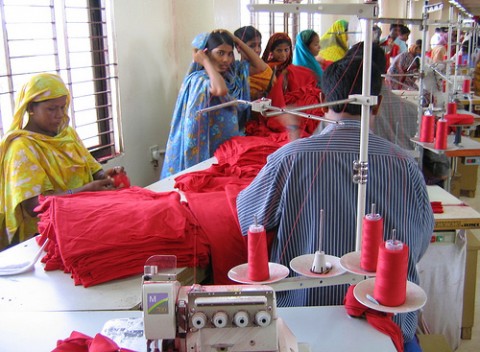Feeling the heat from international pressure, Bangladesh passed new labor laws to help improve worker rights and aid the formation of trade unions. But human rights groups say that law has only made “modest” improvements.
Steven Greenhouse from New York Times has the full article:
Under Pressure Bangladesh Adopts New Labor Law
Published: July 16, 2013- Facing intense international pressure to improve conditions for garment workers, Bangladeshi lawmakers amended the country’s labor law this week. But while the officials called the new law a landmark strengthening of workers’ protections, rights groups said the law made only modest changes and took numerous steps backward that undercut unions.
Bangladeshi lawmakers adopted the new law three weeks after the United States suspended Bangladesh’s trade preferences, saying that labor rights and safety violations were far too prevalent in that country’s factories. Moreover, the European Union has threatened to revoke Bangladesh’s trade privileges for similar reasons.
Speaking about the new law, Khandaker Mosharraf Hossain, the chairman of the parliamentary subcommittee on labor reforms, told Reuters: “The aim was to ensure workers’ rights are strengthened, and we have done that. I am hoping this will assuage global fears around this issue.”
The Bangladeshi government has faced fierce pressure to improve conditions for the nation’s four million garment workers since the Rana Plaza factory building collapsed in April, killing 1,129 workers.
Under the new law, factories will be required to set aside 5 percent of profits for a welfare fund for employees, although the law exempts export-oriented factories. Apparel is Bangladesh’s dominant industry, with $18 billion in annual exports, making it the world’s second-largest garment exporter after China.
As under the old law, workers hoping to form a union must gather signatures of 30 percent of a company’s workers — a level that was onerous, labor leaders said, because many apparel manufacturers have thousands of workers. To make unionizing easier, labor leaders were urging lawmakers to adopt a 10 percent threshold. In Bangladesh, several unions might represent employees in a single factory.
Business leaders complain that Bangladeshi unions are highly political and sometimes stage disruptive strikes as a complementary tactic to political blocs’ lobbying and infighting.
In a step that could help unionization, the new law bars the country’s labor ministry from giving factory owners the list of the 30 percent of workers who want to form a union. Labor leaders said that after receiving those lists, owners often fired union supporters or pressed many to withdraw their names from the petition, bringing the number below the requisite 30 percent mark for a union to be recognized.
Some labor leaders expressed concern that government officials would still give the names to factory owners, perhaps because of collusion or bribes.
“The government says this will make it easier for workers to organize,” said Babul Akhter, the president of the Bangladesh Garment and Industrial Workers Federation. “That’s not true.”
Mr. Akhter praised the legislation for adding some protections on fire and building safety: it strengthens requirements for permits when a factory adds floors.
Human Rights Watch said, however, that the new law would make unionizing harder. It criticized the legislation for adding more industrial sectors, including hospitals, where workers would not be permitted to form unions. The group noted that workers in Bangladesh’s important export processing zones would remain legally unable to unionize.
In addition, the government would be empowered to stop a strike if it would cause “serious hardship to the community” or be “prejudicial to the national interest.” And workers at any factory owned by foreigners or established in collaboration with foreigners would be barred from striking during the operation’s first three years.
“The Bangladesh government desperately wants to move the spotlight away from the Rana Plaza disaster, so it’s not surprising it is now trying to show that it belatedly cares about workers’ rights,” said Phil Robertson, deputy Asia director for Human Rights Watch. “This would be good news if the new law fully met international standards, but the sad reality is that the government has consciously limited basic workers’ rights while exposing workers to continued risks and exploitation.”
Under the new law, unions would need government approval before they could receive technical, health, safety or financial support from other countries.
An Obama administration official said various agencies were seeking to obtain the exact language of the new law in order to study it.
Roy Ramesh Chandra, a powerful Bangladeshi labor leader, said the legislation might not have done enough to persuade Europe not to suspend trade preferences or to get Washington to reinstate such preferences.
Jim Yardley contributed reporting.
